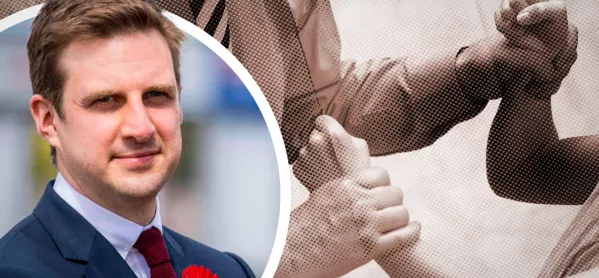Should restraint and seclusion school guidance become law?

Scottish Labour MSP Daniel Johnson will today launch a consultation on enshrining in law the existing guidance on physical restraint and seclusion in schools in order to ensure that it is only used as a last resort.
The use of physical restraint and seclusion in schools is currently regulated only by guidance rather than law in Scotland. Mr Johnson - who is today launching a consultation on a member’s bill - and children’s rights campaigners say the guidance is difficult to enforce and that there are significant inconsistencies in the data collected and the definitions being used.
Children’s commissioner Bruce Adamson undertook an investigation into restraint and seclusion in schools that exposed a number of serious concerns. Only 18 of Scotland’s 32 local authorities could provide any data on the use of restraint and seclusion in schools, and they collectively reported 2,674 incidents relating to 386 children. That equated to around 5.6 incidents per child.
The commissioner’s investigation was published in 2018 and last year he called for new official guidance on the use of restraint in schools to be “put on a statutory footing”.
He said that children and staff needed “the protection and clarity that statutory guidance brings”.
- Background: Guidance on the use of restraint not enough, says commissioner
- Behaviour: Call for new law on restraint and seclusion in schools
- Long read: The “safe spaces” that are anything but
- Seclusion: Commissioner calls time on seclusion in schools
Mr Johnson’s proposed bill would:
- Create a requirement to record and report all incidents to an existing Scottish government body.
- Establish a role for this body to monitor the approach to seclusion and restraint in schools and make recommendations for improvement.
- Inform parents or carers of each incident of seclusion or restraint, including details of the circumstances and the methods used.
- Implement a complaints process to provide a clear route for concerns over seclusions and restraint to be escalated.
- Provide a statutory basis for standards of training for school staff, including teachers and teaching assistants.
- Require data, including on the incidence of seclusion and restraint, to be regularly published by the Scottish government and reported to the Scottish Parliament.
The move is being backed by campaigners such as Beth Morrison, who has fought for a change in the law after her son, Calum, was physically restrained at school, and also by the charity Enable Scotland.
Restraint and seclusion guidance ‘isn’t enough’
Lucy McKee, an Enable Scotland Membership Ambassador, said that Mr Johnson’s bill is “vital” because current guidance for schools is not binding, and is not doing enough to protect young people from harm.
She added: “This is about the human rights of children with learning disabilities, and we hope this proposal will be supported by MSPs from all parties.”
Mr Johnson said: “Schools must be a safe place for children to learn; teachers must be supported and empowered to enable learning; and parents must have confidence in how schools discharge this duty.
“All too often teachers face situations in their classroom for which they have not received adequate training. They have not had the time or the opportunity to learn about the underlying conditions which cause these distressing situations that they have to deal with.
“That is why I believe there needs to be a change in the law.”
He added: “While we have made progress and the Scottish government has brought forward guidance, this does not have the weight of law, nor does it have the other mechanisms that children, parents and teachers need when it comes to the use of physical interventions in school settings.”
Ms Morrison, who is also founder and CEO of Positive and Active Behaviour Support Scotland (PABSS), said the latest report from the UK’s children’s commissioners to the United Nations Committee on the Rights of the Child had recommended that the use of restraint, seclusion and restrictive practices should be subject to mandatory recording and monitoring in Scotland. She called for an end to “blanket restraint training” and for school staff to be given “the right skills and expertise to do the jobs they love”.
Friday 29 September is the final day to take part in the consultation on the proposed restraint and seclusion bill.
You need a Tes subscription to read this article
Subscribe now to read this article and get other subscriber-only content:
- Unlimited access to all Tes magazine content
- Exclusive subscriber-only stories
- Award-winning email newsletters
Already a subscriber? Log in
You need a subscription to read this article
Subscribe now to read this article and get other subscriber-only content, including:
- Unlimited access to all Tes magazine content
- Exclusive subscriber-only stories
- Award-winning email newsletters
topics in this article



